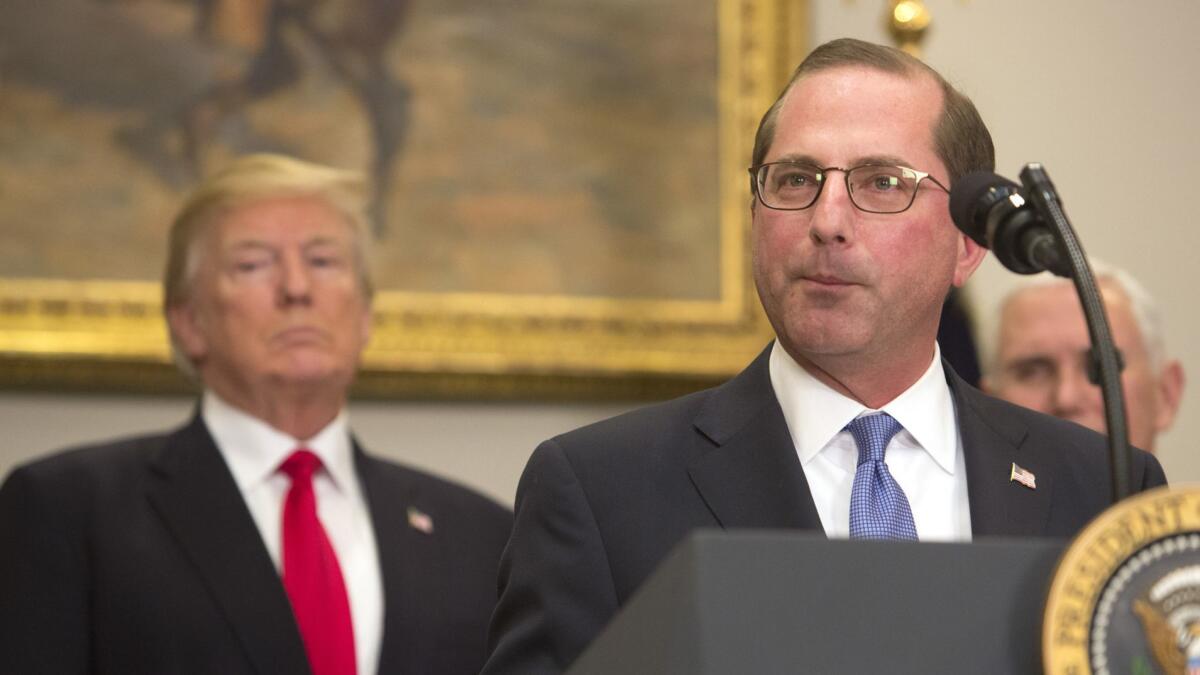Column: The fine print of those short-term health plans favored by Trump: Don’t get sick on a weekend

- Share via
The Trump administration’s most insidious attack on the Affordable Care Act involves its loosening of the rules covering short-term health plans. How insidious?
Thanks to the patient advocacy group EverThrive Illinois, we can take a look at a typical plan currently offered in that state and 12 others by UnitedHealth Group. The fine print listing services not covered by the plan — the “exclusions” — is long and in many respects shocking.
Before we get to the ugly details, some background. These plans are bare-bones plans that the ACA limits to maximum terms of 90 days, and can’t be renewed. They’re not designed as substitutes for real health insurance, but merely as bridges for individuals or families making a transition from job to job or coverage to coverage.
Short-term plans are exempt from many of the consumer protections imposed by the ACA. They can carry lifetime maximum benefits and don’t have to provide the minimum essential benefits required of ACA plans. Almost no short-term plans cover maternity care, for instance.
President Trump wants to make them more broadly available, though not more useful for policy-holders. As the Kaiser Family Foundation notes, last year he issued an executive order directing the secretary of Health and Human Services to expand the availability of short-term health insurance policies, and a proposed regulation to increase the maximum coverage term to up to one year and to allow renewals.
Healthcare experts fear that these rules, combined with the effective elimination of the ACA’s individual mandate enacted last December with the Republican tax cut, would allow short-term plans to siphon younger, healthier customers from the overall health insurance pool. Insurance would be cheaper for them, because the policies would cover less; but much more expensive for everyone left in the pool, including those with a health condition that otherwise would be uncovered.
That brings us to the short-term plan marketed by UnitedHealth’s Golden Rule subsidiary. It’s sold today in Illinois, Arizona, Florida, Iowa, Indiana, Mississippi, Michigan, Nebraska, Pennsylvania, Tennessee, Texas, Wisconsin and West Virginia. What’s unclear is whether the insurer would market the same plan under Trump’s proposed changes, but it’s likely that many of its provisions would remain the same.
To begin with, the Golden Rule plan excludes pregnancy and provides for a lifetime maximum benefit of only $250,000. Remarkably, it won’t cover hospital room, board or nursing services for patients admitted to a hospital on a Friday or Saturday, unless for an emergency or for necessary surgery the next day. (In other words, if you get sick, make sure you do so early in the week.)
The plan excludes coverage for pre-existing conditions, and defines those as any condition for which “medical advice, diagnosis, care, or treatment was recommended or received” in the two years prior to the policy going into effect. It also excludes coverage for a condition for which “an ordinarily prudent person” would have sought advice or treatment in the 12 months prior to the effective date.
It should be obvious that these provisions are an open invitation to the insurer to delve deeply into a customer’s health profile retroactively for two years should he or she present UnitedHealth with a claim. This was a habit health insurers engaged in freely before the ACA, which banned the practice, was enacted. If Trump and his minions think it’s a good idea to turn this particular clock back by eight years, they should say so openly.
The plan’s prescription benefit is capped at $3,000, and it’s skimpy even within that limit: Customers receive only a discount card that reduces prescription costs by 20% to 25%. That could leave them on the hook for hundreds or thousands of dollars in expenses for any brand-name drug, and even for some generics.
There’s no coverage for chemotherapy in many cases. Newborn care is limited to five days. in some states mammography isn’t covered. Mental health care, including substance abuse treatment, is out. And all care must be provided by UnitedHealth network doctors and hospitals. Go to a non-network provider, and you’re on your own.
EverThrive Illinois unearthed this policy in the course of preparing to introduce a bill in the state Legislature that would block the Trump administration’s initiative on short-term plans. Among other things, the measure would limit short-term plans to 90 days in Illinois and maintain all the consumer protections already enshrined in state law. That’s a worthy effort, and the legislators, if they’re smart, will fall into line.
Short-term plans played a useful role under the ACA, but strictly as a temporary lifeline. When they’re limited to 90 days, the exclusions and restrictions can’t do much damage. But expand them to a year, especially when they can be renewed year after year, and they become time bombs for the unwise or unwary that will detonate just at the moment that genuine health coverage is most needed, as after a serious injury or a bad-news diagnosis.
That’s when customers discover just how little they cover. Suddenly the bill for Trump’s sabotage of the Affordable Care Act comes due, and these skimpy, cheap plans stop looking like such a bargain.
Keep up to date with Michael Hiltzik. Follow @hiltzikm on Twitter, see his Facebook page, or email [email protected].
Return to Michael Hiltzik’s blog.
More to Read
Sign up for Essential California
The most important California stories and recommendations in your inbox every morning.
You may occasionally receive promotional content from the Los Angeles Times.











